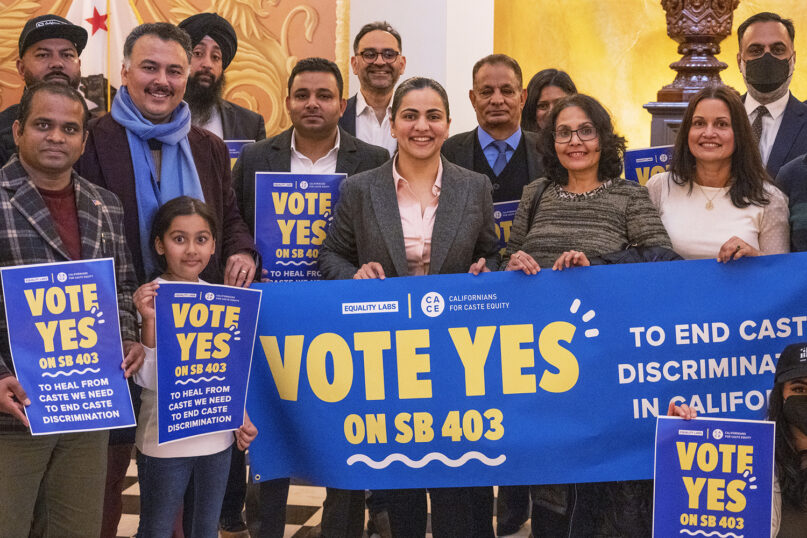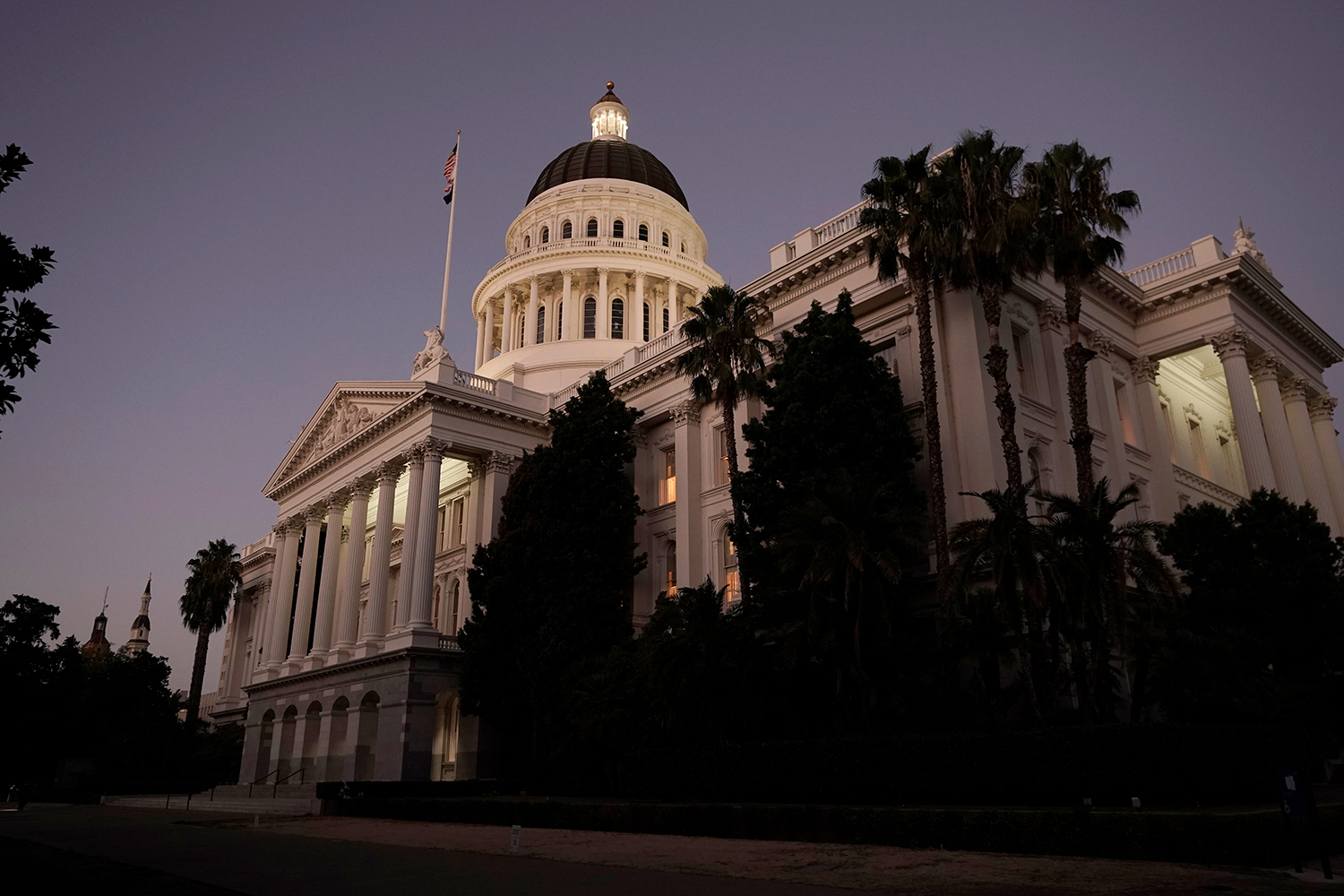California’s caste bill passes key hurdle with 50-3 Assembly vote
Senate Bill 403 exposed a rift among members of the South Asian American community over the prevalence of caste-based discrimination in the United States.
 Califiornia state Sen. Aisha Wahab, center, stands with supporters after a news conference where she proposed SB 403, a bill that would add caste as a protected category in the state’s anti-discrimination laws, in Sacramento, Calif., March 22, 2023. (AP Photo/José Luis Villegas)
Califiornia state Sen. Aisha Wahab, center, stands with supporters after a news conference where she proposed SB 403, a bill that would add caste as a protected category in the state’s anti-discrimination laws, in Sacramento, Calif., March 22, 2023. (AP Photo/José Luis Villegas)(RNS) — A contentious bill that would declare caste as a protected category under California’s existing anti-discrimination law was passed by the state’s Assembly in a bipartisan 50-3 vote Monday evening (Aug. 28), with 27 members abstaining. The legislation, which had already passed the state Senate, is expected to become law with the governor’s signature.
Known as Senate Bill 403, or SB403, the bill was originally introduced by Sen. Aisha Wahab in February and will revise California’s Unruh Civil Rights Act, education and housing codes by adding caste as a protected category under “ancestry.”
Senate Bill 403 became a national cause that exposed a rift among members of the South Asian American community over the prevalence of caste-based discrimination in the United States.
While many South Asians agree that caste has an impact on many lives across the diaspora in the United States, some feel that explicitly outlawing caste discrimination only serves to reaffirm caste differences among, and prejudice against, the U.S. Hindu community. A vocal group who opposed the bill argued that the caste system has been unfairly equated with the Hindu religion in the American imagination.
As a result of monthslong protests from Hindu advocacy organizations that followed the bill as it moved through the California Legislature, SB403 now contains no explicit mentions of South Asia or Hinduism.
On Monday, Equality Labs, a civil rights organization dedicated to Dalit advocacy and the bill’s co-sponsor, released a statement celebrating the effort to raise awareness of caste-based discrimination to the legislative stage.
“SB403, at its core, is an anti-discrimination bill and does not target any religious or cultural groups; that would directly go against the bill’s very nature,” the statement says. “There is no underlying agenda or controversy surrounding the legislation. People of all faiths, backgrounds, and nationalities have peacefully united to advocate for SB403 — creating a truly stunning response to the international call for caste equity.”

The lights of the state Capitol glow into the night in Sacramento, Calif., Aug. 31, 2022. (AP Photo/Rich Pedroncelli)
The Ambedkar King Study Circle, named after the social reformer and drafter of the Indian Constitution, B.R. Ambedkar, posted a statement on X, formerly Twitter: “This monumental bill puts an end to caste discrimination, extending legal protection to all facing caste oppression. A huge step towards equality and justice”
The Ambedkar International Center called it “a defeat for the caste deniers.”
Hindus for Human Rights, a Hindu advocacy organization that is vocal about the issue of caste bias, said in a statement: “On the 60th anniversary of the March on Washington, Dr. King’s dream takes one more step into reality.”
But while many celebrated what they see as a win for marginalized South Asian communities, some opponents are still dissatisfied with the bill’s passage, especially in light of what they say is unsubstantiated evidence of caste discrimination in the U.S.
Suhag Shukla, executive director of the Hindu American Foundation, which led the charge against the bill, released a statement saying, “Fifty California legislators chose to side with anti-Hindu hate groups rather than showing moral courage and upholding the Constitution. When a state legislator pushes a law with the intent of targeting an ethnic community, it’s not only racist, it’s unconstitutional.”
The Coalition of Hindus of North America also bemoaned “the passing of a bill which is NOT facially neutral and written to specifically target Hindu Americans,” calling it “the latest in a long line of unjust bills, (such as the Asian Exclusion Act), which were popular at the time of their passing and were used to target minorities of color.”
In recent years, colleges and universities began adding caste to their list of differences, along with race and sexuality and gender identity, that were protected against bias. Brandeis University banned caste discrimination over complaints from some Hindus in 2019; the California State University system added caste to its nondiscrimination policy in early 2022.
In June 2020, an unnamed Indian-origin Cisco employee accused two of his managers of passing him over for a promotion. California’s Civil Rights Department sued the two defendants in a yearslong case that ended when it was dismissed due to lack of evidence.
More recently, 12 of the complainants in a 2021 lawsuit that alleged forced labor among “lower-caste” artisans on the BAPS Swaminarayan Temple of Robbinsville, New Jersey, retracted their claims, saying they were coerced into making false allegations of caste discrimination.
The amended California bill will now return to the Senate for a floor vote, then will be sent to Gov. Gavin Newsom.
“We will explore every option to protect the rights of Hindu Californians,” said Shukla.
No comments:
Post a Comment